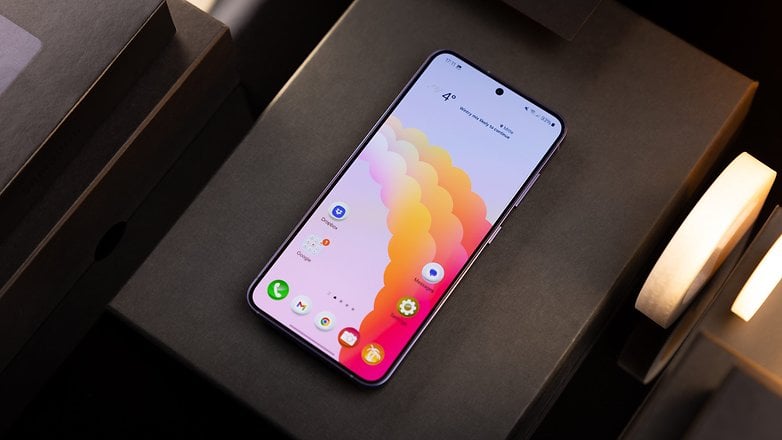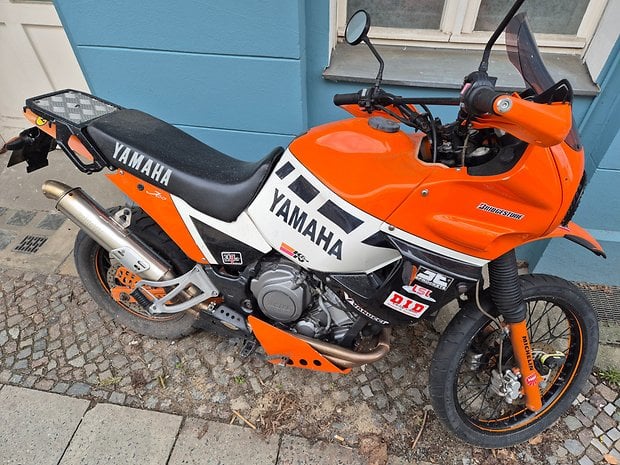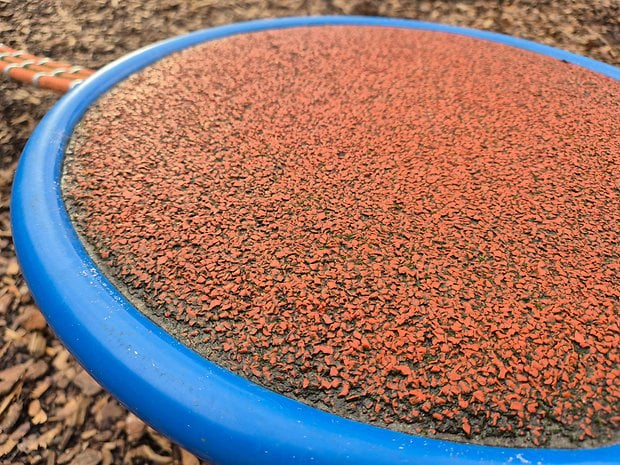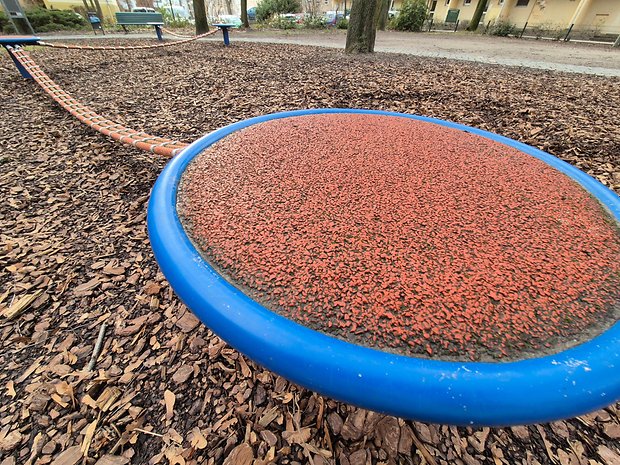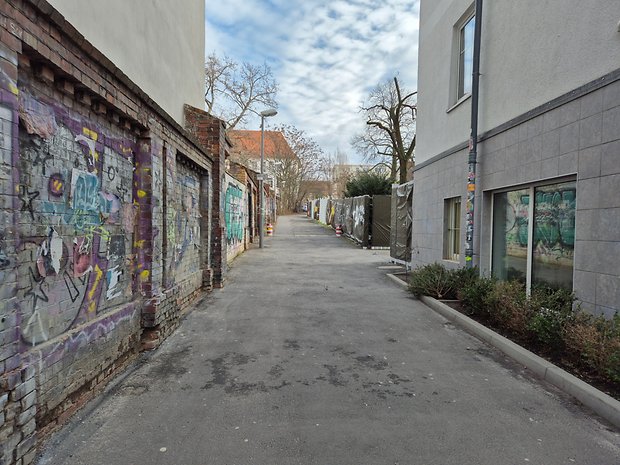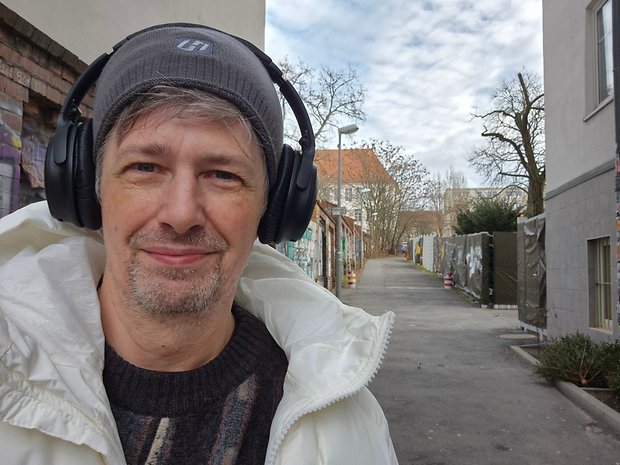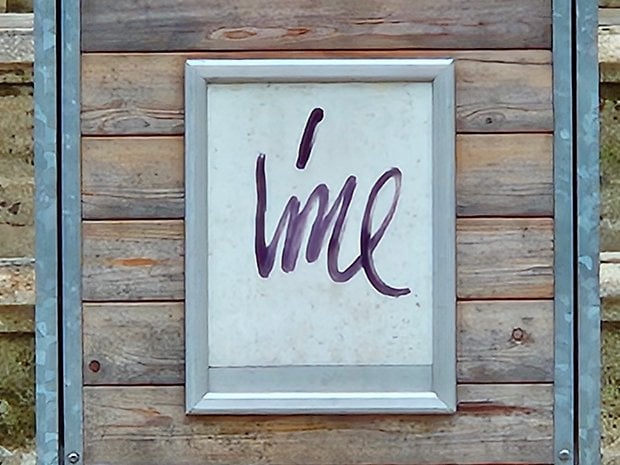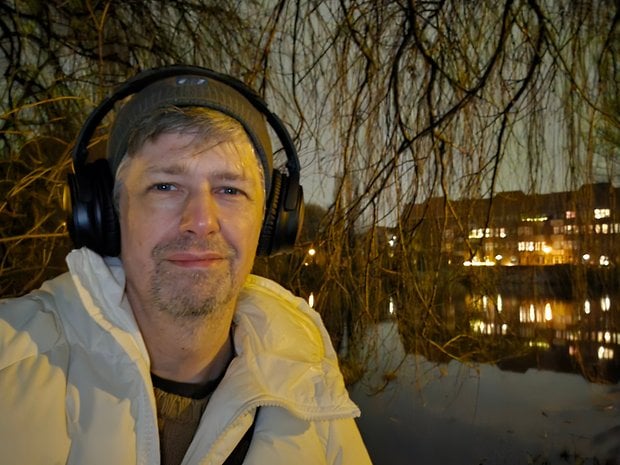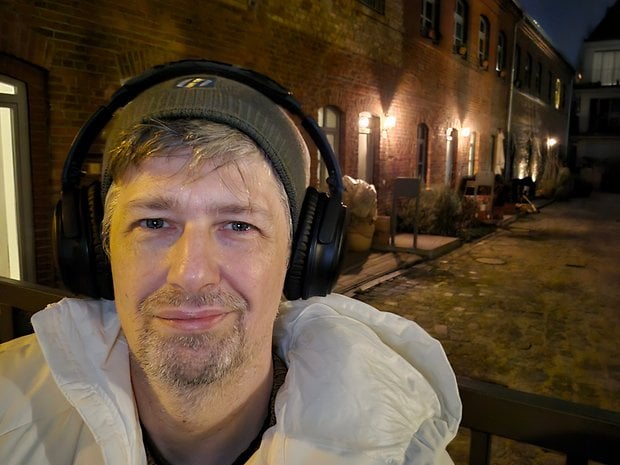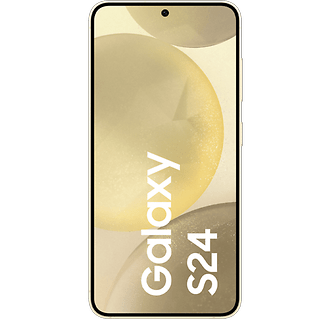
Samsung has successfully presented its new flagship trio in the form of the three Samsung Galaxy S24 smartphones. This year, the Galaxy Unpacked event focused in particular on Galaxy AI—in other words, artificial intelligence. But is Samsung just ticking off a current buzzword in the specs sheet or is the Samsung Galaxy S24, actually a small or even major revolution? The following nextpit test will now cover this—enjoy reading and commenting!
Good
- Powerful AI functions
- Outstanding display
- Compact and good feel
- Commendable update policy
- Performance is absolutely okay
Bad
- No camera upgrade
- 128 GB UFS 3.1 memory
- Larger battery, shorter runtime
- Charging not up to date
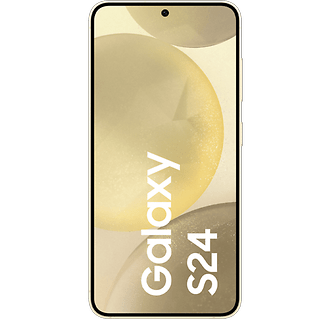
Samsung Galaxy S24: All deals
Galaxy S24 in a nutshell
The Samsung Galaxy S24 not only stands out as the smallest Android smartphone of the recently presented trio, but also as the cheapest at $800. That’s the same price the South Korean company charged us last year for the Samsung Galaxy S23 with the same memory configuration.
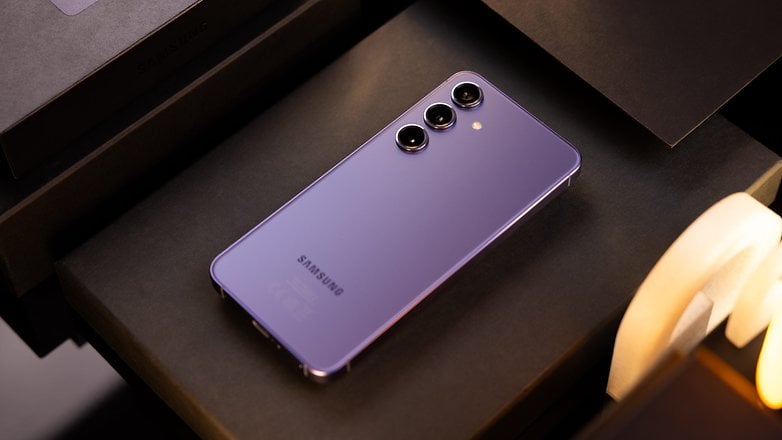
Besides the base model, Samsung also offers the Galaxy S24 with 256 GB. doubling the storage capacity takes the price to $860. You can choose between four color options—there are even three more exclusive color options on the Samsung webstore.
Due to the lack of optional expansion via microSD card, I would strongly advise you to buy the 256 GB version. Besides extra space for apps and photos, the 128 GB version only uses the old UFS 3.1 memory instead of the faster UFS 4.0 memory (256 GB). We already know this from the predecessor Galaxy S23 nextpit reviewed last year.
But what’s new? The Samsung Galaxy S24 has a slightly larger display (6.1 to 6.2 inches), with a narrower edge and therefore practically the same dimensions. This makes the device quite compact—especially in comparison to what passes for a “standard display” these days. Samsung is also using LTPO technology in the Corning Gorilla Glass 2-protected screen this year—the battery has been increased to 4,000 mAh and the 25 W charger still has to be purchased separately.
The AI innovations are impressive and even though “only” an Exynos processor is installed in the global version, we did not notice any disadvantages in the test. In my opinion, the Samsung Galaxy S24 is absolutely worth recommending, although Galaxy phones traditionally drop prices soon after launch.
Samsung Galaxy S24 design and build quality
The Samsung Galaxy S24 has only grown in micrometers to 147 x 70.6 x 7.6 mm. Nevertheless, it has lost weight. Even though it is only one gram lighter on the scales at 167 g, the battery has become slightly larger-but more on that later.
Pros:
- Excellent feel.
- IP68 certification.
- Buttons are well positioned.
- Good sound.
Cons:
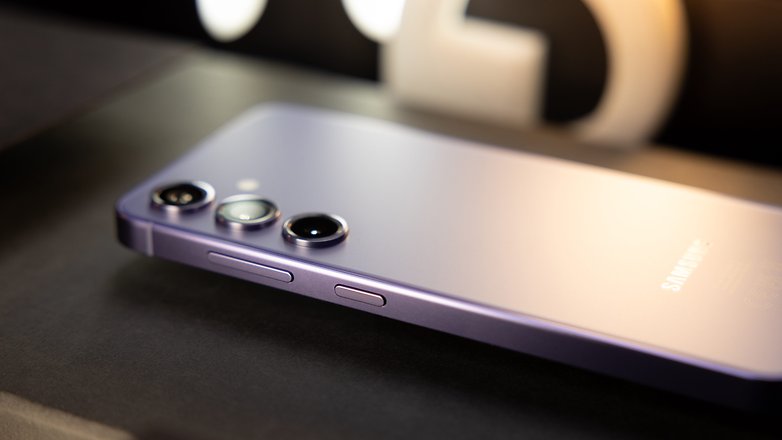
This year, the South Koreans are showing an even clearer edge when it comes to design, which Apple fans can interpret as inspiration from the iPhone. At least I like it. The buttons are optimally positioned on the right-hand side, although I would have liked a visual or tactile distinction. As is typical for Samsung, the build quality is beyond reproach and, at least in our “Cobalt Violet” color, is pleasantly resistant to fingerprints despite the Corning Gorilla Glass Victus 2 on the front and back. Of course: IP68 certification dust and water protection is also included.
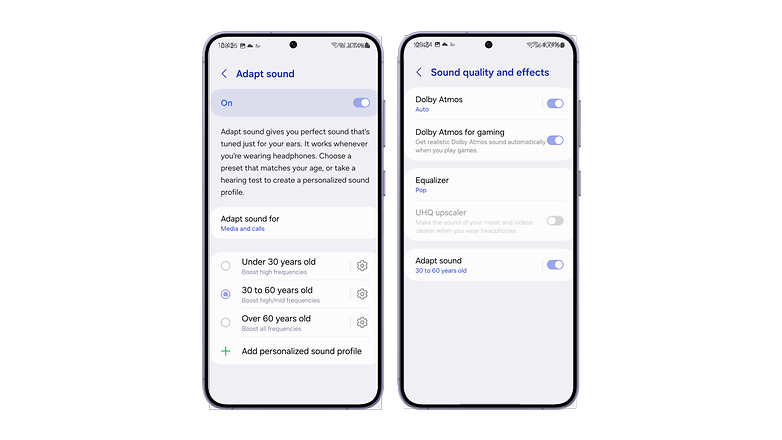
With the three cameras arranged vertically on the top left rear, the S24 fits in perfectly with Samsung’s current design language. The Samsung Galaxy S24 is equipped with stereo loudspeakers, which also offer a balanced sound image after appropriate settings.
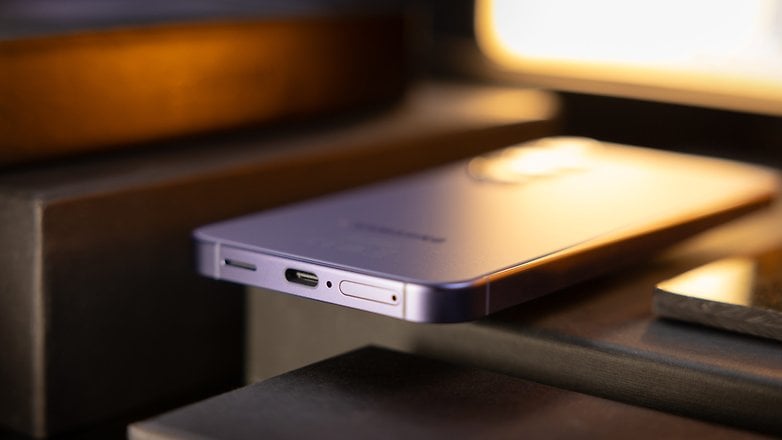
And yes, for the sake of completeness, it should be mentioned: The Samsung Galaxy S24 has neither the option for memory card expansion, nor an IR blaster or an analog jack connection. However, it does have a USB Type-C port in accordance with the USB 3.2 Gen 1 standard (no MHL).
Samsung Galaxy S24 display
Samsung’s “Dynamic AMOLED 2X” display has not only become 0.1 inches larger diagonally this year, but now also features LTPO technology. This allows the Samsung panel to display the refresh rate variably from 1 to 120 Hz.
Pros
- Hardly any edge.
- Even flatter.
- LTPO display.
- Maximum brightness of 2,600 nits.
Cons
- Resolution cannot be changed.
Apart from what has already been mentioned, not much has changed. The non-adjustable resolution is still 2,340 x 1,080 px, which inevitably results in a slightly lower pixel density (416 ppi) on the larger surface—but let’s be honest: nobody would have noticed that. More noticeable is the very, very narrow display edge, as you can see here in direct comparison with the Xiaomi 14.
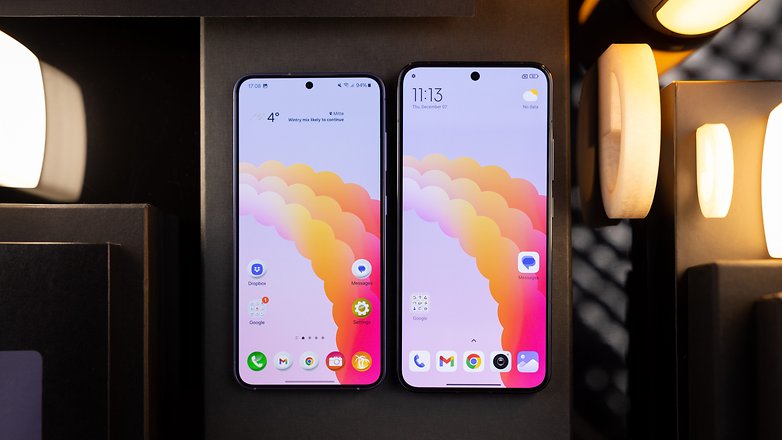
When I first tested the Chinese version of the Xiaomi 14, I had already noticed how narrow the strip between the screen and the edge of the case had become—but it feels a bit narrower on the Samsung. Or is this an optical illusion caused by the larger Xiaomi display?
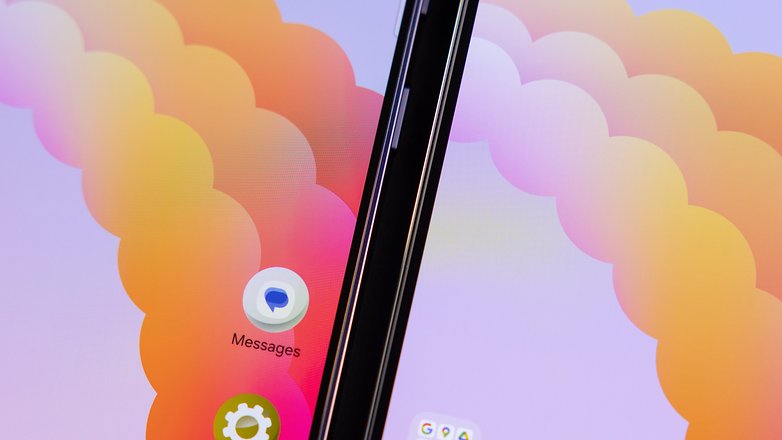
In addition to the LTPO upgrade, HDR10+ support, and the even flatter display, Samsung is offering a higher peak brightness of 2,600 nits this year. That’s quite a boost, which should allow you to use the Samsung Galaxy S24 even in direct sunlight.
This year, too, the display of the screen is simply magnificent—and it is set to get even better. Samsung promises an update in the coming weeks, which should improve the screen dynamics even further. But even today I can already say: I like the contrast, dynamics, and viewing angle stability exceptionally well. The Galaxy Theme Manager, which offers a rich selection of always-on display themes as well as the typical background images (wallpapers), icons, and fonts, is a lot of fun.
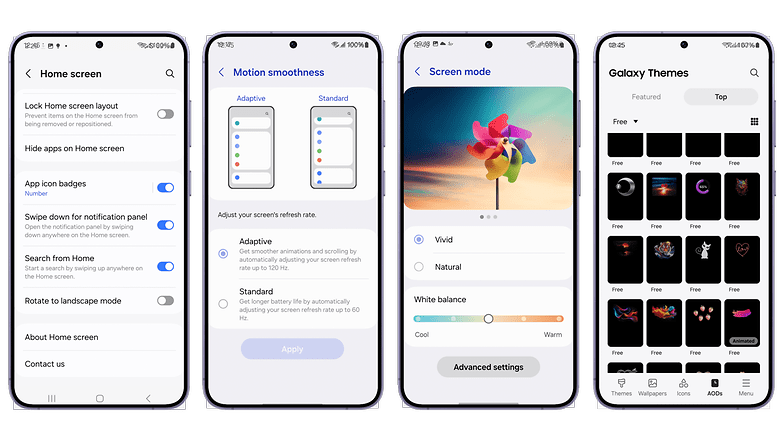
Samsung Galaxy S24 software
The Samsung Galaxy S24 surprises with two main features this year: The Samsung Galaxy AI-i.e. artificial intelligence-and an update promise for seven years. This means that you will get an Android smartphone with the in-house One UI 6.1 based on
Android 14 (security patch from January 2024) and, if everything goes according to plan, you will still be able to install Android 21 on your Samsung smartphone in 2031.
Pros
- Industry-leading update policy.
- Free Galaxy AI (for now).
Cons
- Secrecy of technical data
- Galaxy AI not yet error-free.
- Somehow bloatware after all.
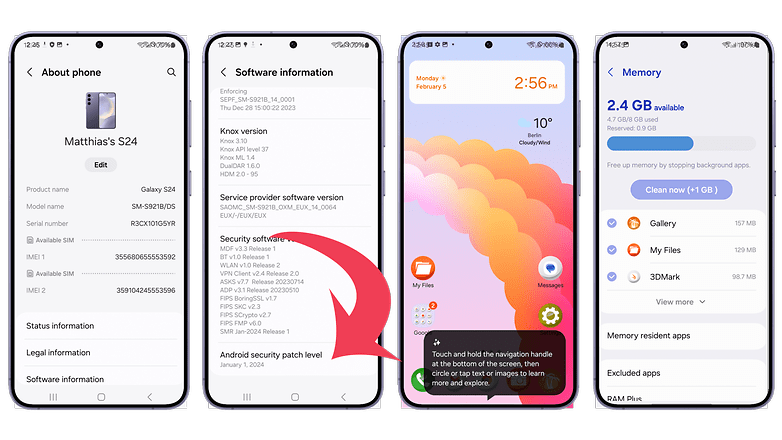
That all sounds pretty positive, doesn’t it? But I can’t help but come out as a party-popper: First of all, nothing can be said about the actual truth content as far as the update guarantee for system and security is concerned. So let’s skip that point and take Samsung’s word for it for now.
A lot of time was devoted to Galaxy AI at the Galaxy Unpacked event, which is why I can’t simply skip the topic here, even though Stefan went to a lot of trouble on the subject in his Galaxy AI hands-on article. I would like to emphasize the following points about Samsung/Google artificial intelligence:
All these functions on the Galaxy S24 are a lot of fun and can make your everyday life much easier. But: You need a Samsung account to use them, free use is only granted until the end of 2025—and not everything works reliably so far.
This may not matter for things like an AI-generated background in a picture, but if I have a phone call with a business partner and Google translates things incorrectly (as happened), it’s no longer fun and, in the worst case, can cost you your job. As mentioned before: The AI package is still free. However, if a subscription becomes mandatory, a lot of hard work will be required. Sometimes it still feels a bit like a free beta test.
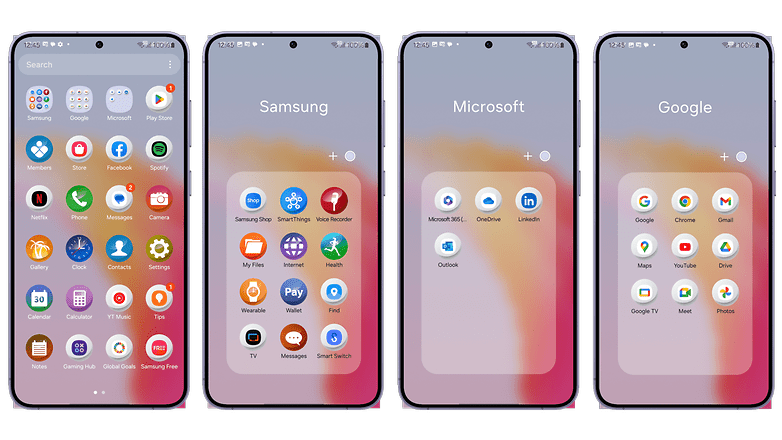
Last but not least, in the software category, I can’t help but criticize the large number of apps and app links on a smartphone costing just under $800. But I count over 100 applications on the device, some of which are from Samsung itself or Google services, but LinkedIn, Microsoft, Netflix & Co. are also available straight out of the box. Really, Samsung?
Samsung Galaxy S24 performance
The topic of performance is a little tricky in the case of the global Samsung Galaxy S24. Samsung is splitting its fans into two involuntarily divided camps: Team Snapdragon and Team Exynos. US shoppers are supplied by the Californian chip manufacturer Qualcomm, which has its SoCs produced by TSMC, while the rest of the world goes with Samsung’s own foundry, which is not exactly known for power-efficient chips…
Pros
- Exynos 2400 is completely sufficient.
Cons
- Split CPU sourcing in different markets.
- Outdated 128 GB UFS 3.1 memory.
Based purely on the data-sheet, you might favor the 10-core Exynos 2400, as it seems superior to the Snapdragon 8 Gen 3 with its eight cores. I have no intention of boring you with frequencies, nanometer sizes, Cortex cores, and RayTracing of the GPU at this point. My colleague Rubens can do that much better in his review of the Samsung Galaxy S24+. Samsung uses the identical processor here, which nevertheless leads to different results in the benchmark test.
To summarize briefly: The Snapdragon appears to be the better choice on balance, as it generates less heat and consumes less power. Longer gaming sessions are therefore not necessarily the Exynos processor’s strong point.
| Galaxy S24 (Exynos 2400) |
Galaxy S24+ (Exynos 2400) |
Galaxy S24 Ultra (Snapdragon 8 Gen 3) |
Galaxy S23 FE (Exynos 2200) |
Xiaomi 13T Pro (Dimensity 9200) |
iPhone 15 Pro (Apple A17) |
|
|---|---|---|---|---|---|---|
| 3DMark Wild Life Extreme Stress Test |
|
|
|
|
|
|
| 3DMark Solar Bay stress test |
|
|
|
|
||
| Geekbench 6 |
|
The Samsung Galaxy offers a standard 8 GB LPDDR5X of RAM. In terms of storage, the South Korean manufacturer promises 128 GB of UFS 3.1 and 256 GB of UFS 4.0 modules for its base model, and in some countries, 512 GB is also offered. It is noticeable that the models with 256 GB memory are more modern and therefore also faster in terms of read and write speed.
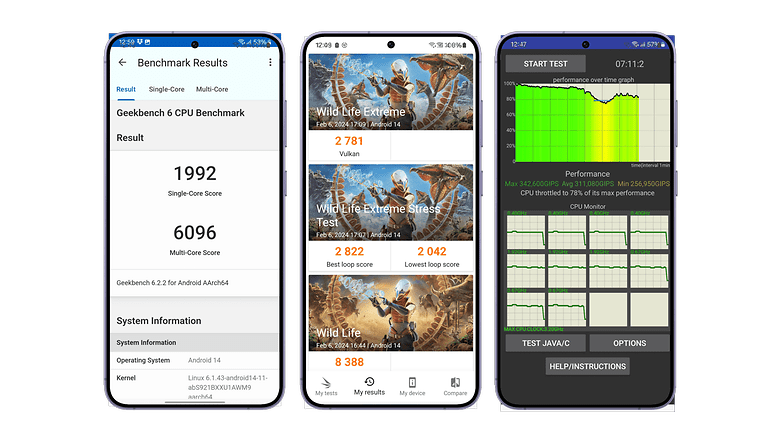
Unfortunately, our test device is only blessed with 128 GB, which may explain the poor benchmark results despite the ten-core processor. The results are also strikingly worse than those of its Plus brother, which actually has the same processor. However, this could also be due to poorer heat dissipation.
However, if we don’t get into the nerd bashing and just concentrate on everyday use, you can certainly feel a slight warming on the back when playing performance-intensive games such as Real Racing 3, Battlefield Mobile, PUBG, and Genshin Impact. Not unpleasant, but unnecessary.
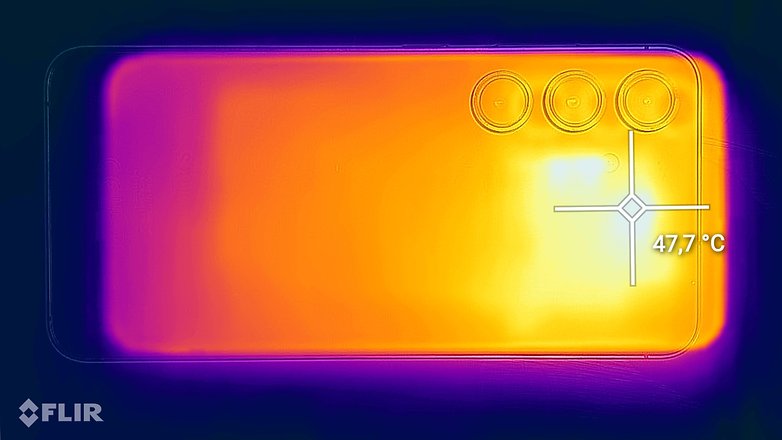
The ten-core processor, which is manufactured using the 4 nm process, copes with everyday use without any problems, as no thermal throttling is required here either.
Samsung Galaxy S24 camera
I could basically copy this section 1:1 from the review of the Samsung Galaxy S23. Samsung hasn’t changed anything at all on the hardware side. It retains a 50 MP main camera with optical image stabilization (OIS), an aperture of f/1.8 and an equivalent focal length of 24 mm. The 12 MP ultra-wide-angle camera with a maximum field of view of 120 degrees and the 12 MP telephoto zoom camera with triple optical magnification and OIS are also unchanged. Yes, the South Koreans have even left the 12 MP front camera with its equivalent focal length of 26 mm at an aperture of f/2.2 untouched.
Pros
- Excellent selfies.
- 50 MP RAW shots.
- Reference daytime shots.
- Good night shots (thanks to AI).
Cons
- No macro mode.
- Wide-angle shots.
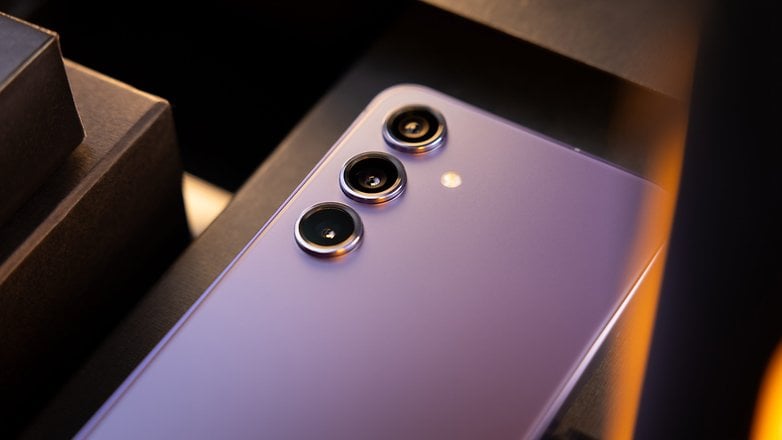
Some people may take a deep breath here—but the camera trio wasn’t bad in 2023—quite the opposite. So why should Samsung tinker with it and perhaps even change it for the worse?
“Never touch a running system” or rather “never change a winning horse”.
And Samsung is doing an excellent job with this, as the following picture galleries prove. Especially now that the AI is also helping!
Even though Berlin only offered a dull black, white, and grey panorama, daytime shots offer a natural reproduction of the actual colors, contrast, and sufficient dynamics. The sky in particular has a real cinematic flair in the half-empty house. However, it is noticeable that the two image sensors for primary and wide-angle shots are not matched to one another. The colors are very different.
Of course, the Samsung smartphone also has a few things to offer in the effects department. And woe betide me if I read something about Apple in the comments on the photo with the cropped fairytale figure. Unfortunately, there is no real macro mode, but the close-ups are consistently successful.
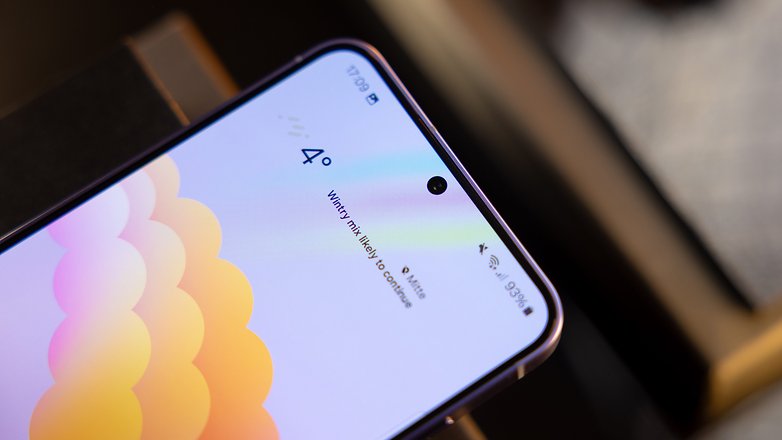
I was surprised by the zoom shots. Up to 10x magnification, the photos are still quite presentable. Selfies are also pleasing and offer really nice color reproduction, as in the photo with the long alley in the background.
Even night photos hardly upset the front and main cameras. Okay, if you take a closer look at the photos on the PC, you will notice the lack of detail at the edges. But I am convinced that the Samsung Galaxy S24’s camera still achieves the best results here. What do you think of the photos? Feel free to write us a few sentences in the comments.
Samsung Galaxy S24 battery
In fact, the Samsung Galaxy S24 loses the important points for a 5-star victory in this category! And the South Koreans did everything right, didn’t they? At least they have pumped up the battery compared to last year-to a total capacity of 4,000 mAh. But the upgrade was not helped by the department responsible for the Exynos processor!
Pros
- Larger battery.
- Wireless charging.
- You’ll get through the day.
Cons
- SoC eats up extra energy.
- Record for slow charging.
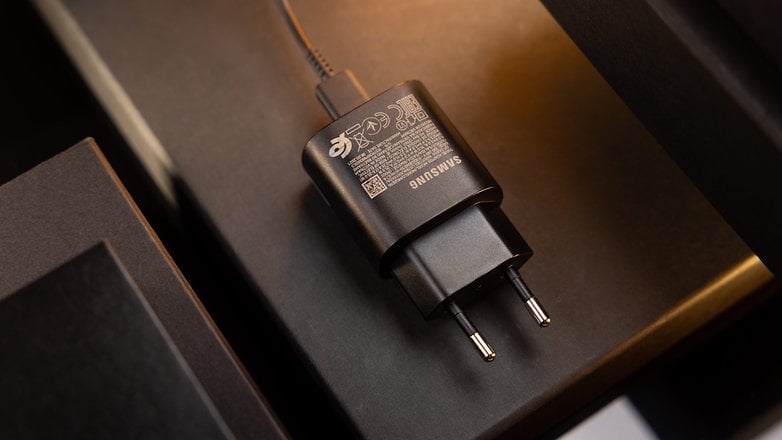
And so in the “Work 3.0 Battery life” test, with flight mode switched on, 200 nits screen brightness, and a remaining capacity of 20 percent, the blow came directly in the face: The Samsung Galaxy S24 lasts less than the Galaxy S23, which is equipped with the smaller battery. At 13 hours and 6 minutes, it is still 38 minutes away from the S23. Sure—not a world of difference, but the S24 should actually be more energy-efficient thanks to its newer processor. Not to mention that the battery holds more mAh.
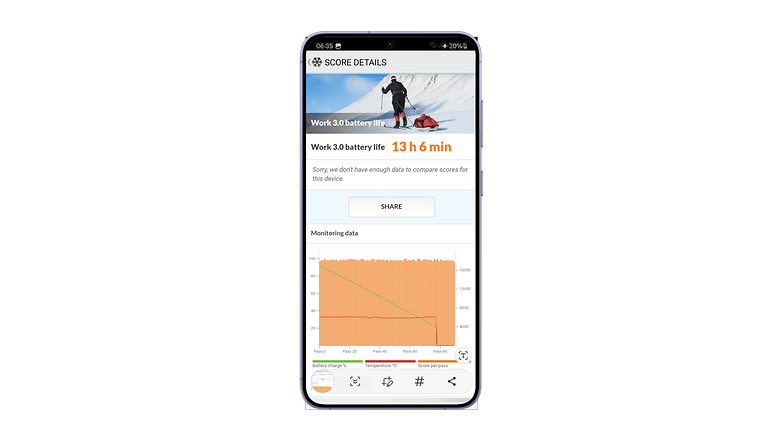
I don’t really feel like reporting on the charging speed anymore. Sure, Samsung wants to avoid past issues with flammable batteries. But hello, it’s 2024 and you’re still charging your flagship smartphones with a maximum of 25 W? You also manage to make your smartphone lighter, even though the battery has more capacity.
So the charging cycle lasts accordingly:
| Galaxy S24+ (EP-TA800 | 25W) |
Galaxy S24+ (Wireless) |
Galaxy S24+ (EP-TA800 | 25W) |
OnePlus 12 (SuperVOOC 100W) |
Xiaomi 13T Pro (HyperCharge 120W) |
Pixel 8 Pro | |
|---|---|---|---|---|---|---|
| 5 minutes | ||||||
| 20 minutes | ||||||
| 30 minutes | ||||||
| 1 hour | ||||||
| Full charge | ||||||
| PC Mark Acute | ||||||
Samsung Galaxy S24 technical specifications
| Technical data | |
|---|---|
| Name of the device | |
| Screen |
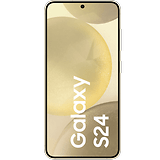 |
| Screen | 6.2-inch, dynamic AMOLED display, 2,340 x 1,080 pixels (FHD+) at 416 PPI 120 Hz refresh rate, touch response 240 Hz (game mode) Corning Gorilla Glass Victus 2 |
| Dimensions | 147 x 70.6 x 7.6 mm |
| weight | 167 g (incl. battery) |
| SoC | Exynos 2400 (4 nm) 10 cores |
| Memory | 8 GB LPDDR5X RAM 128 GB UFS 3.1 ROM 256 GB UFS 4.0 ROM |
| Software | One UI 6.1 based on Android 14 |
| Expandable memory | No |
| Main camera | 50 MP | f/1.8 aperture | 1/1.56 inch | equivalent focal length 24 mm | viewing angle 85° OIS, PDAF, Dual Pixel |
| Ultra wide-angle camera | 12 MP | f/2.2 aperture | 1/2.55 inch | equivalent focal length 13 mm | viewing angle 120° Super Steady Video |
| Telephoto camera | 10 MP | f/2.4 aperture | 1/3.94 inch | equivalent focal length 70 mm | 3x optical zoom | 36° angle of view OIS, PDAF |
| Selfie | 12 MP | f/2.2 aperture | equivalent focal length 26 mm | viewing angle 80° PDAF, Dual Pixel |
| Video | 8K @ 24/30 fps | 4K @ 30/60 fps | 1080p @ 30/60/240 fps Super Slow Motion 1080p @960 fps Stereo, EIS |
| Audio | Stereo Speaker Tuned by AKG 32-bit / 384 kHz |
| Battery | 4,000 mAh |
| Charging by cable | 25 watts |
| Wireless charging (Qi) | 15 watts 4.5 watts (reverse) |
| IP certification | IP68 |
| Connectivity | 802.11 a/b/g/n/ac/6e 2.4/5G, 5G, Bluetooth 5.3 (aptX HD, aptX, LDAC, LHDC, AAC, SBC), GPS (dual band), GLONASS, GALILEO (dual band), Beidou USB Type-C (3.2) NFC |
| Colors | Onyx Black, Marble Grey, Cobalt Violet, Amber Yellow, Jade Green, Sandstone Orange, Sapphire Blue |
Final verdict
That’s it again, the detailed review of the Samsung Galaxy S24. To make a long story short: The S24 offers only subtle changes to its predecessor. These include a slightly larger display (now with LTPO technology), a slightly larger battery, the advantage of which is immediately negated by the energy-hungry processor, the Galaxy AI artificial intelligence, and a lower price.
The Samsung Galaxy S24 (please only with 256 GB) is therefore an absolutely recommendable Android smartphone with a full seven-year update guarantee!
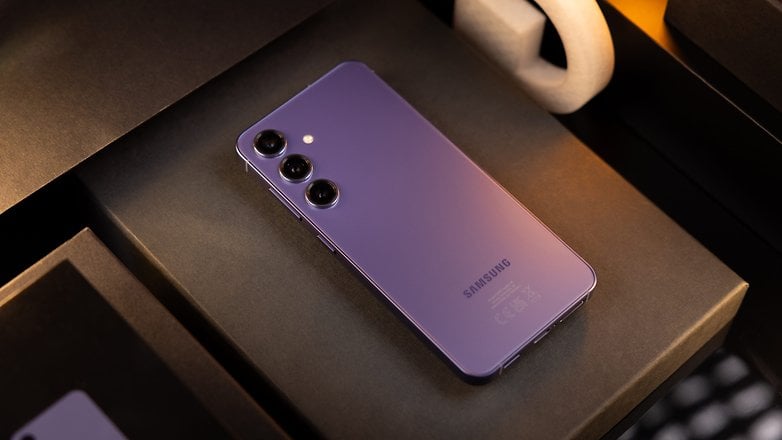
However, if you want to save a lot of money, I recommend the Samsung Galaxy S23, which has identical cameras, lasts just as long in terms of battery life, and will also soon get the “still” free AI. Don’t get me wrong: Samsung hasn’t done anything seriously wrong with the S24. Unfortunately, it hasn’t improved much either—and the exciting AI features will also be coming to the predecessor in the first half of the year. But of course: What else—apart from the battery—should Samsung have improved?
